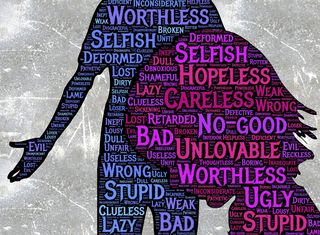Traumatic Brain Injury
People Who Judge People With Concussion
Is telling a person not to talk about brain injury appropriate after diagnosis?
Posted October 14, 2018

The doctor's office is utilitarian: chair, desk, plain walls, papers strewn across faux wood. The diagnosing physician relates in neutral tones that your brain has been knocked about and is now damaged. You leave. And then over the months, more and more of your concussion reveals itself to you. Years, actually. Concussion is such an old word that connotes "no big deal." But with each new revelation comes a tiny bit more discernment about what this diagnosis means.
Babies die from being shaken; adults aren't unaffected either.
Your life is destroyed.
Concussion means destruction.
Concussion is a brain injury that no one explains to you in ways that you can understand because your instrument of understanding -- your brain -- can no longer take in language at normal speed, process information efficiently, add to existing knowledge, and remember for longer than a few minutes. Your instrument of understanding also tends to get stuck on an idea, an event, a word, a tone, an encounter, like an old-fashioned needle in a dirty vinyl record. "Rumination," they call it. Only someone willing to use simple words and pictures, willing to speak slowly and in even tones, willing to repeat themselves for days, weeks, months, years, willing to answer your same questions as if you had never asked them before, can help you gradually and painfully figure out what concussion really means.
Yet you must grasp the enormity of the injury, perceive the long-term ramifications, and decide on the best treatments immediately else the eyes of compassion upon you turn to slits of animosity, accusations of malingering.
Humans understand by talking. Human beings with brain injury land over and over on the same point because we cannot process language and concepts with automaticity anymore; because we get lost on the way to understanding; because rumination hiccups our progress. Yet while still lost in understanding, and even when embarking on recovery, the first words you hear from so-called loved ones, words some psychiatrists seem to think are valid, are: "You talk too much about your brain injury. Stop talking about your brain injury. Brain injury this. Brain injury that. Talk about something else. No one wants to hear you talk about your brain injury. You have no friends because all you talk about is brain injury. No one wants to be with you when you do that all the time. You need to get on with your life. You can't do that when you're obsessed with brain injury."
Love.
Is judgment.
When you have a brain injury.
Is this an appropriate response to a person stuck with a diagnosis not even health care professionals fully understand, enduring losses that no one could ever imagine are possible, striving and failing to regain normal life with a brain that no longer knows how to execute skills automatically such as walking, talking, cooking yet without the medical system actively treating stretched axons and shredded blood supply?
Would someone say to a person diagnosed with cancer, pale from their disease, fatigued from their treatments: "You talk too much about your cancer treatments. Go for a long walk and get on with your life. You spend too much time on health care. You'd be better off if you focused on something else."?
Is judgment a way to heal a person? Does criticizing relentlessly and bleating to the person with a brain injury about how hard it is to be with them, help them recover? When did we as a society come to believe that criticism and judgment are effective in treating an injury and supporting a person through the tough times of recovering?
Copyright ©2018 Shireen Anne Jeejeebhoy. May not be reprinted or reposted without permission.


